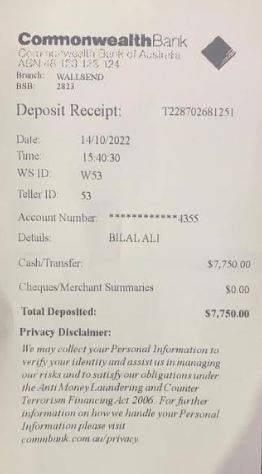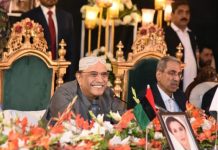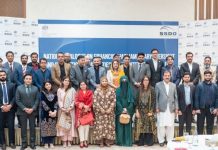DNA | EXCLUSIVE
ISLAMABAD: The pursuit of an Australian education is a dream for many aspiring students worldwide, including those in Pakistan. Unfortunately, amidst the genuine aspirations, there is a growing concern about fraudulent agencies exploiting the aspirations of Pakistani students by offering fake services for Australian education visas. These unscrupulous operators jeopardize the dreams of students and tarnish the reputation of Australian education in the eyes of the international community.
In recent years, a number of fake agencies in Pakistan have surfaced, claiming to provide foolproof services for securing Australian education visas. These entities often promise guaranteed visa approvals and quick processing times, preying on the desperation of students seeking to study in Australia.

These agencies may also claim to have exclusive partnerships with Australian universities or colleges, offering admission to fictitious courses. In reality, there is no affiliation, and the students end up with non-genuine enrollment, putting their visa status at risk.
Australian Educational counsel (AEC) Sahiwal is one such institutions which, reportedly has made huge sums by offering visas to students. Unfortunately, this institute despite extracting huge money has failed to arrange visas for the students.
A student Bilal Ali s/o Muhammad Ali has complained that he had paid required amount to the above-mentioned agency but even then, no visas has been arranged for him. Now when they approach the agency nobody is there to entertain them, he accused.

Bilal, a dedicated student, expressed his aspiration to pursue studies in Australia, highlighting his impressive educational background. He revealed that his parents, committed to supporting his dreams, sold their agricultural land to secure the necessary finances. Subsequently, they entrusted those funds to a specific company for the purpose of facilitating Bilal’s overseas education.
However, to their disappointment, the agreed-upon time frame passed without the company fulfilling its commitment to send Bilal abroad for his studies. This unexpected delay has left Bilal and his family in a state of concern and frustration, as they had made significant sacrifices and arrangements in anticipation of this educational opportunity.
It may be mentioned here that the Australian government is aware of these fraudulent activities and has been working to address the issue. It has issued warnings through its official channels, cautioning prospective students in Pakistan about the risks associated with relying on unauthorized agents for visa assistance.
While the dream of studying in Australia is entirely attainable for Pakistani students, caution must be exercised to avoid falling victim to fraudulent schemes. By being vigilant, conducting thorough research, and using official channels, aspiring students can protect themselves from unscrupulous individuals and ensure a legitimate and successful pursuit of their educational goals in Australia.
UN FAO’ s 40 ambitious projects to revolutionize agriculture in Pakistan: Country Rep
Mudassar Iqbal
ISLAMABAD, Nov 19 (APP):The United Nations Food and Agriculture Organization’s (FAO) on Sunday unveiled a dynamic portfolio of 40 diverse projects strategically dispersed across various regions of Pakistan. These initiatives, with varying scopes, financial parameters, and target audiences, underscore the FAO’s commitment to fortifying the agriculture and food security sectors in the country.
In an exclusive panel interview with the Associated Press of Pakistan (APP), Country Representative Florence Rolle and Assistant FAOR (Programs) Dr. Aamer Irshad highlighted the proactive role of the FAO in numerous initiatives and programs aimed at strengthening Pakistan’s agriculture and food security sectors. These initiatives span a spectrum, including enhancing agricultural productivity and sustainability, supporting livestock and fisheries development, and implementing food security programs to alleviate hunger and malnutrition.
The FAO’s involvement extends beyond traditional agricultural support. The organization actively engages in sustainable natural resource management, providing humanitarian assistance during emergencies, and collaborating closely with the Pakistani government on policy development. Additionally, the FAO supports research and innovation while helping Pakistan adapt to the challenges posed by climate change.
Rolle outlined FAO’s 2023–2027 priorities with Pakistan: enhancing food availability, strengthening climate-responsive planning, and improving agricultural value chains. The focus includes nutrition policy, climate frameworks, support for enterprises, disease control, and women’s empowerment in agriculture.
She explained that project selection is based on a thorough consultative process, aligning with the United Nations Sustainable Development Cooperation Framework (UNSDCF) 2023–2027. The FAO’s Country Programming Framework (CPF) for 2023–2027 involves consultations with relevant ministries, departments, academia, UN agencies, and resource partners at both federal and provincial levels.
Highlighting the FAO’s commitment to accountability, Rolle underscored the presence of a robust monitoring and evaluation system with units in Islamabad and across provinces. This system plays a pivotal role in shaping program effectiveness by providing guidance based on lessons learned.
Discussing assessment methods, Dr Aamer Irshad emphasized the efficiency and accuracy of modern scientific tools, particularly satellite technology, in evaluating crop damage. Rolle acknowledged challenges in assessing areas adjacent to large riverine regions and reiterated the FAO’s advantage in utilizing satellite technology in such scenarios.
As a UN agency, the FAO collaborates closely with governments worldwide, operating primarily in partnership with government entities at federal and provincial levels. The organization also engages with academic institutions, research organizations, and NGOs, employing a versatile approach tailored to the specific context and needs of each project.
Aamer discussed the Living Indus initiative, a government-backed endeavor where the FAO serves as the technical lead. In addressing threats to the Indus basin, she emphasized the pivotal role of mass involvement, particularly among the youth, in mobilizing support and creating awareness.
Touching upon the crucial role of youth in agriculture, Rolle emphasized their significance in driving economic growth. She highlighted the need to attract educated youth to the agriculture sector, noting the sector’s evolution toward precision farming, digital technologies, satellite monitoring, and research-based practices.
Dr Aamer Irshad emphasized the necessity of modernizing the sector to make it more appealing to the younger generation.
Despite agriculture contributing 22% to the country’s economy, she stressed the need for strategic reduction without compromising productivity. Large farms benefit from supportive government policies, while smallholder farmers face challenges due to insufficient profits and a lack of business acumen. The UN representative proposed a comprehensive plan involving specialized education, financial incentives, rural infrastructure improvement, awareness campaigns, and technology adoption to make agriculture more attractive to educated youth.
In a broader perspective, Rolle highlighted FAO’s contributions to all Sustainable Development Goals (SDGs), particularly those closely related to six key sub-sectors within agriculture: zero hunger, water resources, fisheries, climate change mitigation, livestock management, gender, and food losses.
As the FAO continues to spearhead initiatives in Pakistan, its comprehensive approach aims at transforming the agriculture landscape and contributing to the achievement of the SDGs.

















